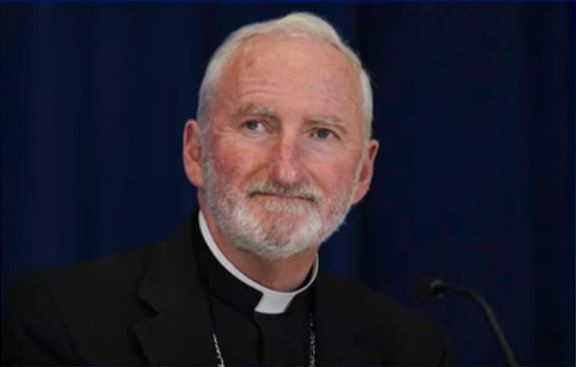
Boston, Mass., Mar 30, 2023 / 12:30 pm (CNA).
An empty tabernacle that was bolted to the wall has been stolen from the residence of the late Los Angeles Auxiliary Bishop David O’Connell, who was murdered in his Hacienda Heights, California, home in February.
A tabernacle is a structure found in a Catholic church or chapel that houses the holy Eucharist, which Catholics profess to be the body, blood, soul, and divinity of Jesus Christ. It is often made of gold and can cost tens of thousands of dollars.
News of O’Connell’s Feb. 18 murder shocked the nation following reports that he died after suffering multiple gunshot wounds. The local and wider Catholic community mourned O’Connell, who was remembered as a man of peace dedicated to serving the poor and immigrants.
First reported by LifeSiteNews, the burglary occurred sometime over the past weekend, the Archdiocese of Los Angeles told CNA in a statement.
The archdiocese said that the tabernacle was located in O’Connell’s personal chapel. The theft was reported to law enforcement and “security has been enhanced,” the archdiocese’s statement said.
Lt. Michael Modica, a homicide detective with the Los Angeles Sheriff’s Department who has been in the late bishop’s residence, told CNA Thursday that he remembered seeing the tabernacle “bolted to the wall.”
The man who was charged with the murder of O’Connell is 61-year-old Carlos Medina, the husband of the woman who was O’Connell’s housekeeper.
Medina pleaded not guilty at his arraignment in court March 22. It remains unclear what the motive for the murder might have been.
Medina is being held on more than $2 million bail and will have his next court hearing May 17.
Before his not-guilty plea, Los Angeles District Attorney George Gascón said in a Feb. 22 press conference that Medina admitted to the murder.
“He admitted that he had done the killing and we believe we recovered the weapon that they were using, and we have other evidence from the bed, certain things that indicate that they were in the place where the killing occurred,” Gascón said in Spanish, translated here by CNA.
Following the revelation of the alleged admission, a current and former colleague of Gascón criticized him for breaking the L.A. District Attorney’s Office’s policy of forbidding the disclosure of a defendant’s admission in an open criminal case.
John Lewin, a former deputy district attorney for Los Angeles, told Fox News Digital that the statement could affect the outcome of the trial.
“It cannot be more simply stated, George Gascón is a D.A. who either doesn’t know the basic ethical rules that govern the agency he leads or doesn’t care to follow them,” he said.
“What if a court decides that the confession will not be admitted to trial? You can’t put that genie back into the bottle,” he added.
John McKinney, a current L.A. deputy district attorney, told Fox News Digital that the disclosure was contrary to police department rules.
“By disclosing a defendant’s confession in an open criminal case, George Gascón has not only committed a blatant violation of LADA policy but has also potentially violated the due process rights of the accused.”
Obtained by CNA, the District Attorney’s Legal Policy Manual states that “at the time of arrest, the issuance of an arrest warrant, the filing of a complaint, or the public revelation of an indictment,” information about a confession, admission, or statement given by the accused shall not be released.
Marc Debbaudt, a former career deputy district attorney for Los Angeles, told CNA Feb. 27 that he didn’t think Gascón’s announcement of the admission could cause the case to be thrown out but said that “it could result in motions to change jurisdiction.”
Three days of memorial services were held for O’Connell, 69, in early March. O’Connell’s funeral was attended by thousands as Los Angeles Archbishop José Gomez called him an intercessor for souls.
Speaking briefly at the conclusion of the funeral liturgy, Gomez said “Bishop Dave,” as O’Connell was affectionately known, would be sorely missed, but “we know that he’s in heaven.”
“From there he’s going to continue to intercede for us,” Gomez said, “as he has done his whole life.”
If you value the news and views Catholic World Report provides, please consider donating to support our efforts. Your contribution will help us continue to make CWR available to all readers worldwide for free, without a subscription. Thank you for your generosity!
Click here for more information on donating to CWR. Click here to sign up for our newsletter.





So, a major theft. And THEN security has been enhanced?? Another case of closing the barn door after the horse is gone. It seems to me that each diocese needs to come up with some mandatory security regulations for both churches, and things like this in private residences. It is not to simply prevent the monetary loss of the value of the item itself ( sometimes valued at “Tens of thousands of dollars”). But also to prevent any possible sacrilege. This is pretty simple to do. It will however cost some money. So what? That is far better than continuing the slipshod treating of these precious religious objects like so much disposable waste.